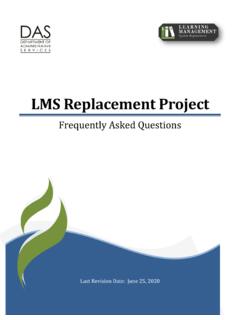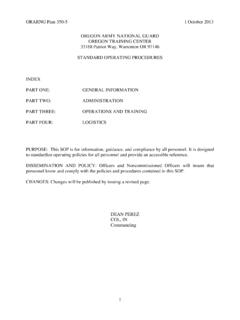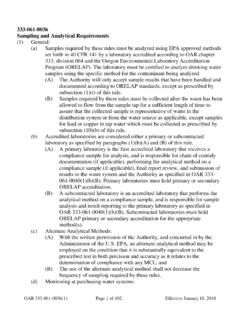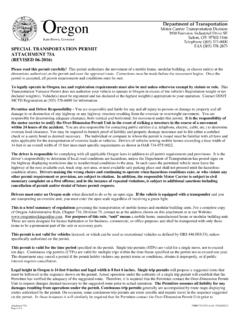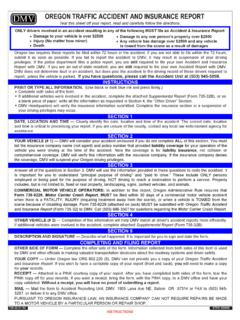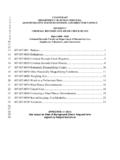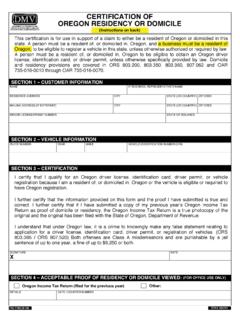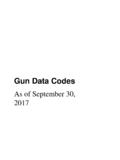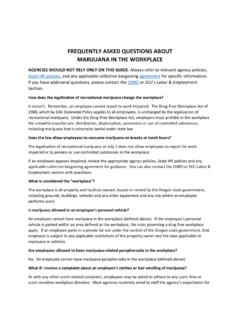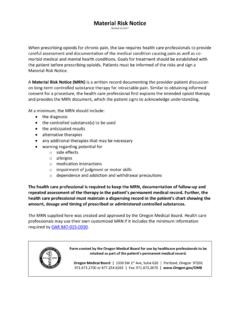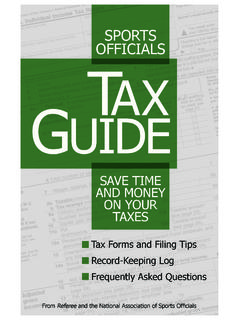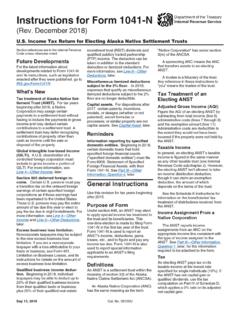Transcription of 2018 Schedule OR-A Office use only 19481801010000
1 First name and initialSpouse s first name and initialSocial Security number (SSN)Spouse s SSNLast nameSpouse s last nameOregon Department of Revenue19481802010000 Oregon Itemized DeductionsSubmit original form do not submit use only2018 Schedule OR-A Page 1 of 1, 150-101-007 (Rev. 01-22-20, ver. 02)Medical and dental expensesCaution! Don t include expenses reimbursed or paid by and dental expenses, (see instructions) .. adjusted gross income (AGI). Enter the amountfrom Form OR-40, line 7 or Form OR-40-N or OR-40-P,line 29F .. threshold. Multiply line 2 by ( ) .. and dental expense deduction. Subtract line 3from line 1. If line 3 is more than line 1, enter -0- .. you and local income taxes. Don t include Oregonincome tax! .. estate taxes, (see instructions) .. property taxes.
2 Income and property taxes. Add lines 5 through t enter more than $10,000 ($5,000 if married filing separately) .. taxes. List type and amount: paid deduction. Add lines 9 and 10 .. you interest and points reported to you on federal Form 1098 .. interest not reported to you on federal Form 1098 .. not reported to you on federal Form 1098 .. insurance premiums (see instructions) .. interest, (see instructions) .. paid deduction. Add lines 12 through 16 .. to by cash or check, (see instructions) .. other than by cash or check, (see instructions) .. from prior year .. gifts to charity. Add lines 18 through 20 .. miscellaneous type and amount. Important! Don t include employee business expenses, tax preparation fees,or other deductions subject to the 2 percent of AGI limitation, (see instructions).
3 Itemized deductions lines 4, 11, 17, 21, and 22 .. 23. Enter the amount from line 23 on Form OR-40, line 16 or Form OR-40-N or OR-40-P, line 37. Read instructions carefully before completing this Schedule . You must include this Schedule with your Oregon income tax return . 00 Congress extended several tax provisions by passing Public Law 116-94. As a result, this form was updated on January 22, 2020.. 00. 00. 00. 00. 00. 00. 00. 00. 00. 00. 00. 00. 00. 00. 00. 00. 00. 00. 00. 00. 00. 002150-101-007 (Rev. 01-22-20)New informationThese instructions were updated in December 2019 after Congress extended the deduction for mortgage interest premiums for tax year 2018. Use Schedule OR-A to figure your Oregon itemized deduc-tions using federal definitions and limitations, with the modifications noted in these instructions.
4 Generally, for Oregon, you re allowed the larger of your itemized deduc-tions or your standard deduction. Note: Your Oregon standard deduction will be zero if you are married filing a separate return and your spouse item-izes, or if you are a nonresident you itemize, you can deduct a part of your medical and dental expenses, amounts you paid for certain taxes, inter-est, gifts to charity, and certain miscellaneous expenses. Don t include items that you deducted elsewhere on your federal or Oregon tax return forms or schedules, such as Schedule C, C-EZ, E, or F. See the Internal Revenue Service (IRS) publications referred to in these instructions for more and dental expensesIn generalYou can deduct only the part of your medical and dental expenses that exceeds of the amount of your federal adjusted gross income on Form OR-40, line 7, or Form OR-40-N or OR-40-P, line of medical and dental payments you can deductTo the extent you weren t reimbursed, and with certain lim-itations, you can generally deduct what you paid for: Insurance premiums for medical and dental care, including Medicare Parts B and D.
5 Prescription medicines and insulin. Healthcare professionals, including medical doctors, dentists, physical therapists, and psychologists. Medical examinations, X-rays, laboratory fees, diagnos-tic tests, and other services. Hospital care and nursing help. Ambulance service and other travel costs. Nicotine cessation, medical weight-loss, and addiction treatment. Hearing aids, eyeglasses, wheelchairs, guide dogs, and other medical aids. Lodging costs and travel for treatment away from home. Lactation of expenses you can t deduct Elective cosmetic surgery. Over-the-counter medications. Drugs that are illegal under federal law. Funeral, burial, or cremation above lists are not exhaustive. IRS Publication 502, Med-ical and Dental Expenses, describes the types of expenses you can and can t deduct in greater detail.
6 It also explains when you can deduct capital expenses and special care expenses for disabled medical and dental expenses can be included?You can include medical and dental bills you paid in 2018 for anyone who was one of the following, either when the services were provided or when you paid for them: Yourself and your spouse. All dependents you are claiming on your Oregon return, and any child you can t claim as a dependent because of the rules for children of divorced or sepa-rated parents. Any person you could have claimed as a dependent on your Oregon return except that their gross income for 2018 was $4,150 or more or they filed a joint return. Any person you could have claimed as a dependent except that you or your spouse (if filing a joint Oregon return) can be claimed as a dependent on someone else s 2018 taxpayer.
7 Certain medical expenses paid out of a deceased taxpayer s estate can be claimed on the deceased taxpayer s final return. See IRS Publication 502 for with the Working Family Household and Dependent Care (WFHDC) creditSome medical expenses for the care of qualifying persons may also qualify as expenses for purposes of claiming the WFHDC credit. These expenses can be included in your itemized deductions or the WFHDC credit, but they can t be used for 1 through 4 Line 1. Medical and dental expenses. Enter the total of your medical and dental expenses, reduced by any pay-ments you received from insurance or other sources. Instructions for 2018 Schedule OR-AOregon Itemized Deductions2018 Congress extended several tax provisions by passing Public Law 116-94.
8 As a result, this form was updated on January 22, (Rev. 01-22-20)Don t include: Payments that your insurance company paid directly to the provider. Amounts that were paid through an employer-spon-sored (cafeteria) plan, unless those amounts were included in box 1 of Form W-2. Expenses that you re using for purposes of claiming the WFHDC 2. AGI. Enter the amount from Form OR-40, line 7, or Form OR-40-N or OR-40-P, line 3. AGI threshold. Multiply line 2 by ( ).Line 4. Medical and dental expense deduction. Subtract line 3 from line 1. If line 3 is more than line 1, enter with the special medical subtractionIf you or your spouse were age 65 or older on December 31, 2018, and your federal AGI wasn t more than $200,000 ($100,000 if your filing status is single or married filing separately), you may qualify for the special Oregon medi-cal subtraction.
9 You ll need the information from Sched-ule OR-A, lines 1 and 4, when you figure your subtraction amount. See Special Oregon medical subtraction in Pub-lication OR-17 for more information. Taxes you paidIn generalYou may deduct certain state or local income taxes or for-eign income taxes you paid during the tax year, such as income taxes paid to a state other than Oregon, mandatory contributions to certain employment-related programs in other states, and taxes on real or personal property located in the United States that are based on the property s value (known as ad valorem tax). Limitation on income and property tax The total amount of income and property taxes you can deduct can t be more than $10,000 ($5,000 if married filing separately). Examples of taxes you can t deduct Oregon income tax.
10 Federal income tax. Sales tax. Tax on real property paid to a foreign country. Social Security, Medicare, unemployment, or railroad retirement tax. Gift tax. Estate tax, other than federal estate tax on income in respect of a decedent (see below). Customs duties. Gasoline tax. License fees. Assessments for property improvements. Taxes you paid for someone income tax. You can t claim an itemized deduction for federal income tax paid during the tax year. However, see Federal tax liability subtraction in Publication OR-17 for more taxes paid to another state. If you re claiming a credit on your Oregon return for income taxes paid to another state, or you claimed a credit on an Oregon return in a prior year for taxes you paid during this tax year, you can t claim those same taxes as an itemized deduction.
